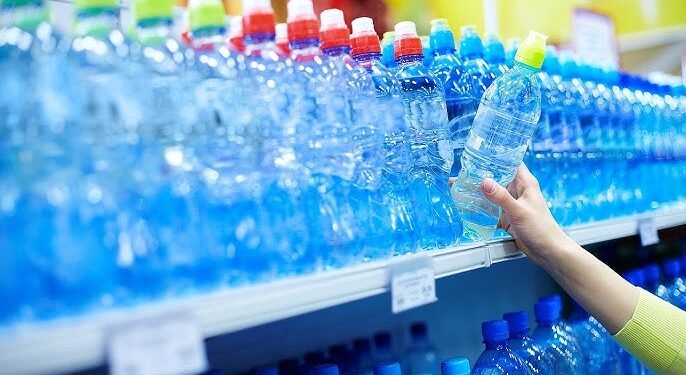Explore the drawbacks of reusing plastic water bottles and understand the reasons behind it in Hindi. Discover the potential hazards and discover other wholesome options at wellhealthorganic.com.
Overview
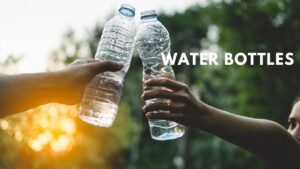
In the contemporary day, the prioritization of convenience frequently supersedes the consideration of environmental awareness. An instance of this is the recurring practice of reusing plastic water bottles. Although it may appear innocuous at first, further examination uncovers numerous justifications for avoiding this behaviour. This extensive book examines the adverse consequences of reusing plastic water bottles and provides insight into the underlying causes, specifically within the Hindi-speaking community.
Environmental Consequences
The ease offered by plastic bottles is accompanied by a concealed expense: the deterioration of the environment. Disposable plastic bottles make a substantial contribution to pollution by causing blockages in landfills, contaminating oceans, and causing harm to wildlife. In addition, their manufacture depletes necessary resources and adds to the release of greenhouse gases, so worsening the problem of climate change.
Comprehending the Hazards of Reusing Plastic Bottles
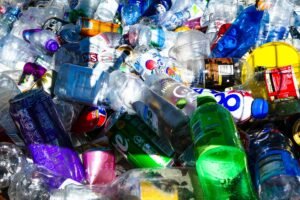
The chemical composition of plastic refers to the specific arrangement and combination of elements that make up plastic materials.
Plastic bottles are commonly manufactured using polyethene terephthalate (PET), which is a synthetic polymer renowned for its lightweight and long-lasting characteristics. Nevertheless, polyethene terephthalate (PET) has the potential to release toxic substances into the water, particularly under conditions of elevated temperature or frequent utilization. Long-term ingestion of compounds such as antimony and bisphenol A (BPA) can lead to significant health hazards.
Microbial contamination refers to the presence of microorganisms, such as bacteria or fungi, in a substance or environment.
Regular utilization of plastic water bottles provides an optimal environment for the proliferation of detrimental microorganisms. Despite extensive cleaning, minuscule remnants of bacteria can persist in the bottle’s cracks, potentially leading to infections and gastrointestinal problems when consumed.
Plastic degradation
With each reuse, a plastic bottle experiences progressive degradation. The exposure to sunlight, heat, and mechanical stress speeds up this process, resulting in the release of microplastics into the water. Drinking water that contains microplastics can negatively impact human health by causing hormone imbalance and inflammation.
Ecological Consequences
The environmental impact of reusing plastic bottles is significant and should be considered. Disposed plastic bottles contribute to pollution on land and in oceans, presenting a substantial menace to species and ecosystems. Moreover, the manufacturing and discarding of plastic bottles contribute to the ongoing process of using up fossil fuels and releasing greenhouse gases, which worsens the problem of climate change.
Microplastics: The Unseen Menace Present in Every Drink
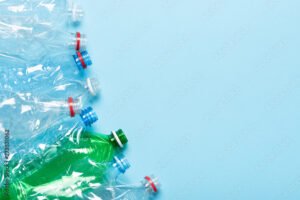
Microplastics, which are little plastic particles measuring less than 5mm in diameter, have permeated our water supplies, food chain, and even the air we inhale. These little contaminants are produced when more oversized plastic objects, such as bottles, degrade. They can contain dangerous chemicals and diseases. The ingestion of microplastics through polluted water or food carries inherent health hazards.
The Fallacy of Recycling
Although there are extensive recycling initiatives in place, the fact remains that only a small proportion of plastic bottles are really recycled. The remaining portion is deposited in landfills and incinerators or becomes litter in the environment, where it remains for extended periods, emitting harmful substances and causing disturbances in ecosystems. The concept of recycling as an effective remedy for plastic pollution needs to be clarified.
Substitutes for Reusing Plastic Bottles
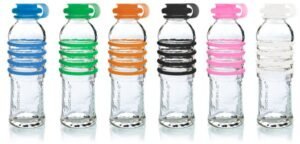
Transition to using reusable water bottles.
Purchasing durable water bottles crafted from stainless steel or glass is a sustainable substitute for disposable plastics. These bottles are devoid of toxic substances, effortless to sanitize, and can be utilized multiple times without jeopardizing safety or flavour.
Employ Water Filtration Systems
By installing water filtration systems in your house or utilizing portable filters, you may access purified and secure drinking water without the need for discarded plastic bottles. This practice not only diminishes the amount of plastic waste but also guarantees the absence of impurities in your water.
Facilitate the dissemination of knowledge and enhance understanding.
Promoting awareness of the hazards associated with reusing plastic bottles and advocating for sustainable alternatives is crucial for instigating significant transformation. By promoting environmental consciousness and advocating for eco-friendly behaviours within your community, you may contribute to reducing the detrimental impacts caused by plastic pollution.
Advancements in Eco-Friendly Packaging Solutions
Thankfully, there is an increasing trend towards sustainable packaging options that seek to reduce the environmental and health effects of plastic bottles. Promising alternatives to conventional plastic bottles include innovations such as biodegradable plastics, plant-based substitutes, and refillable containers. Adopting these advancements can help diminish our dependence on disposable plastics and shift towards a more sustainable economic model.
Corporate responsibility
While people have a significant role in decreasing the usage of plastic bottles, business responsibility is also vital. Beverage companies, bottling producers, and retailers must give utmost importance to sustainability in all aspects of their operations, ranging from product design to disposal. This encompasses allocating resources towards sustainable packaging, establishing programs for product return, and actively supporting legislation that encourages recycling and the reduction of waste.
Education and Awareness
Education and awareness are crucial elements in tackling the plastic bottle epidemic. By providing consumers with information regarding the ecological and physiological consequences of plastic bottles, we enable them to make more informed and deliberate choices when making purchases. This can encompass activities such as promoting awareness through public campaigns, including sustainability teaching into school curricula and offering easily accessible information on alternative packaging choices.
Government actions or measures taken to influence or regulate policies.
Government engagement is crucial in adequately addressing the plastic bottle epidemic. Policymakers should enforce strict rules to restrict the manufacturing, distribution, and disposal of disposable plastic bottles. Measures to address this issue can encompass prohibitions on specific categories of plastics, promoting the adoption of reusable containers, and implementing levies or charges on plastic packaging to account for its ecological impact.
Frequently Asked Questions (FAQs)
Are plastic water bottles safe to reuse?
While plastic water bottles may seem convenient for reuse, they can pose health risks due to chemical leaching and microbial contamination.
How many times can a plastic water bottle be safely reused?
It is recommended to avoid reusing plastic water bottles altogether to minimize health risks and environmental impact.
What are the safest alternatives to plastic water bottles?
Stainless steel and glass water bottles are considered safe alternatives to plastic, as they do not leach harmful chemicals and can be reused indefinitely.
Can plastic water bottles be recycled?
Yes, plastic water bottles can be recycled, but it’s important to note that recycling alone is not a sustainable solution to plastic pollution. Reducing consumption and promoting reusable alternatives are more effective strategies.
What are the environmental consequences of plastic bottle reuse?
The reuse of plastic water bottles contributes to pollution, resource depletion, and habitat destruction, perpetuating the cycle of environmental degradation.
How can individuals reduce their reliance on plastic water bottles?
By adopting reusable alternatives, promoting awareness, and advocating for sustainable practices, individuals can significantly reduce their reliance on plastic water bottles and contribute to a healthier planet.
Conclusion
In conclusion, reusing plastic water bottles poses significant risks to human health and the environment. By understanding the chemical composition of plastic, the dangers of microbial contamination, and the environmental consequences of plastic pollution, we can make informed choices that prioritize sustainability and well-being. It’s time to break free from the cycle of plastic bottle reuse and embrace alternatives that promote health, safety, and environmental stewardship.

